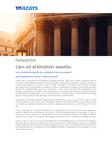
Lien on arbitration awards:
Article published on July 22 in “Ámbito Jurídico”.
Article 130 of Law 1955 of 2019 (National Development Plan - PND, 2018 - 2022) created the special contribution for arbitration awards of economic content. Although the legislator chose to call this levy a special contribution, the fact is that the erratic regulation of its active and passive subjects, generating event, taxable base, causation or accrual, destination and taxed and benefited sectors prevent its characterization as a tax, contribution or rate. Given that the limits applicable to this institution will depend on whether it can be placed in one or another tax category, the impossibility of its classification will necessarily result in a tax collection challenge, with the natural effect on the legal security of taxpayers and the legitimacy of the tax system and the State.
According to reiterated national jurisprudence and doctrine, a tax is a tax when a tax is levied indiscriminately on any person, with absolutely no discretion to decide whether to pay, without cause in a direct or immediate consideration and with indeterminate destination, as in the case of income tax.
A tax is classified as a special contribution if it is compulsorily levied on those who have obtained a particular benefit with the execution of a work or activity of public interest by the State, in order to recover the cost of such work or activity within the limit of the benefit it brings to the taxed individuals and for such purpose, as in the case of the special contribution for the valuation of real estate property.
Finally, a tax is a fee if it is paid as consideration for the performance of a service by the State or whoever takes its place, or the tolerance of the private use of a public property, previously requested and in a discretionary manner by the party obliged to pay it, in an amount determined by the cost of providing the service or maintenance of the property and with an allocation to such purpose, as in the case of the airport tax.
Article 130 of the PND establishes that the active subject of the tax is the Superior Council of the Judiciary, the Executive Directorate of Judicial Administration or a body having the same purpose. Although it is not always indicative of contributive capacity, the generating event of the tax is the issuance of an arbitration award that incorporates an economic benefit higher than 73 SMLMV, whose creditor will be at the same time the taxpayer of the tax.
The taxable base is the amount recognized in the award, without it being possible to deduct the high transaction costs involved in accessing the administration of arbitration justice. The rate is 2%, with a limit of 1000 SMLMV applicable on the amount to be paid. The causation or accrual is concomitant with the forced or voluntary execution of the obligation included in the award. The proceeds of the collection must be destined to the Fund for the Modernization, Decongestion and Welfare of the Judicial Branch.
In view of the above elements, the levy on arbitration awards of economic content created by the PND is not a tax, nor a special contribution, nor a fee.
It cannot be a tax, since it has a specific purpose and is levied on a specific sector, made up of persons who obtained an award in their favor, after voluntarily opting to submit to arbitration justice. It cannot be considered a tax either, since it is not a direct consideration for the performance of a public service or for the tolerance in the particular use of a public good and, therefore, it is not intended to recover its costs, nor is it intended to finance the continuity or maintenance of any service or good. Finally, it cannot be a special contribution, since the State does nothing in relation to the administration of arbitration justice -in itself, private-, therefore, there is no particular benefit caused by public expenditure to be recovered, nor the proceeds of the collection is intended for the exclusive benefit of the users of arbitration justice from whose patrimony it comes.
The impossibility of classifying it as a tax, fee or contribution constitutes an impediment to apply to this figure the limits of each type of tax, which means, in practice, a free pass for tax evasion. This situation being as common as it has become, it is not unreasonable to think that it is not a slip of the legislator, but that this was precisely the purpose: unfortunately, with the progress of the tax legislative technique, the legal security of the taxpayers and the legitimacy of the system are also at stake.


